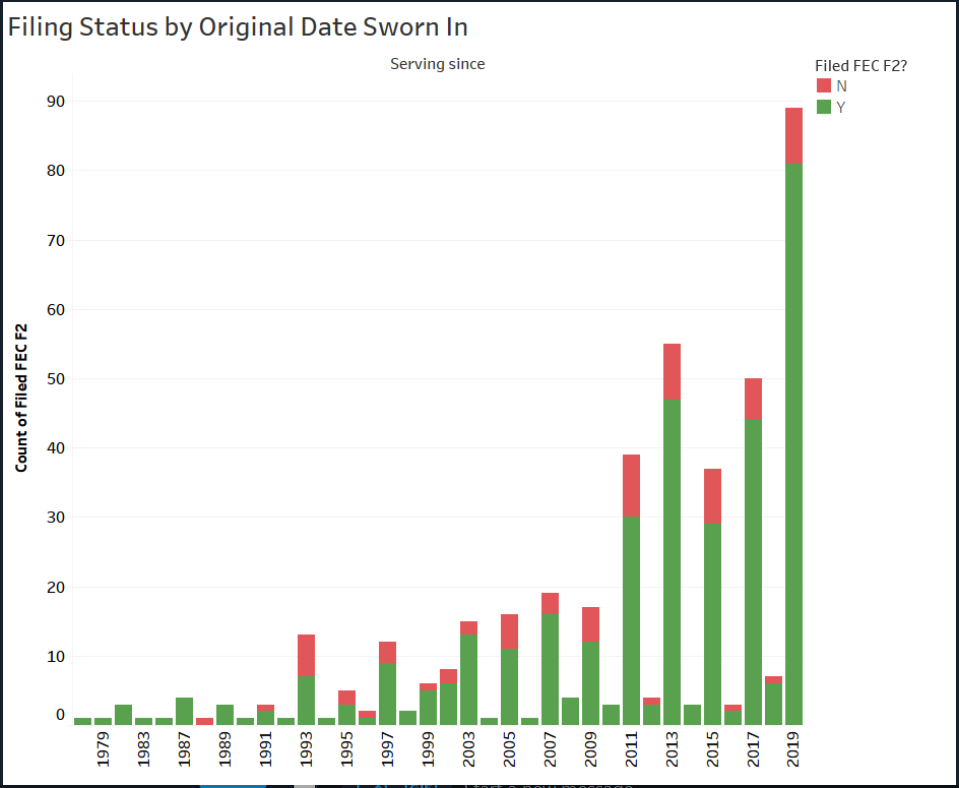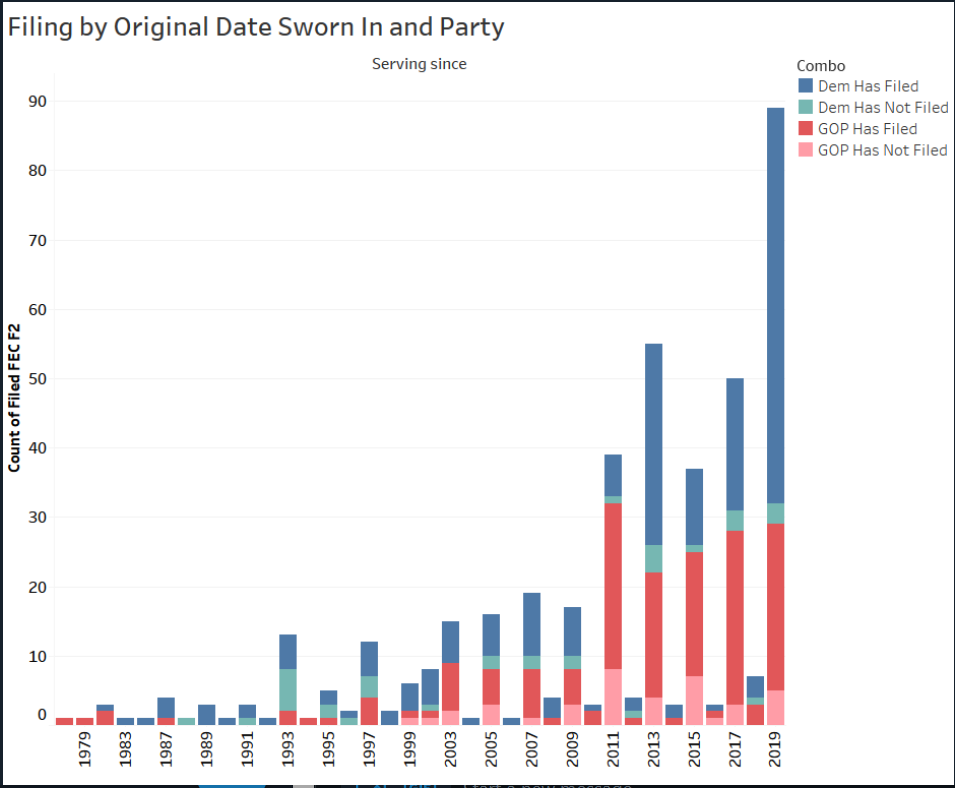Today, guest contributor Jon Prevo, working with contributor Noah Rudnick, brings you the latest information on incumbents that have filed for re-election in Congress.
To give some interactivity to the House 2020 Contest, I’ve included the above data representation vis-à-vis Tableau that shows all the 116th Congress members who have filed their FEC F2 forms, whether they are retiring or not, and for how long they have been serving. What is interesting is that these two things are not mutually exclusive; for instance, Rep. Serrano of New York recently announced his retirement, but he has filed his FEC F2.
Why is this the case? This is because FEC F2 filings (usually filed by campaign managers) allow a representative to fundraise for their party. Members from safe seats often file first because they can fundraise for their party’s central committees, and the money they raise can be used to support vulnerable incumbents or potential challengers.
What is interesting about this map is who has not yet filed to run again. To be specific, a large portion of the CBC—the Congressional Black Caucus—has not yet filed. Reps. Bishop (GA-2), Rush (IL-1), Johnson (TX-30), Scott (VA-3), Thompson (MS-2), Jackson-Lee (TX-18), Cummings (MD-7), Davis (IL-7), Wilson (FL-24), Payne (NJ-10), Kelly (IL-2), Blunt Rochester (DE-AL), and Neguse (CO-2) have all not filed. This is a sizeable portion of the CBC. Many of these members have seniority within the Democratic Party, and waiting to file FEC F2s could open up competitive primaries in their safely Democratic districts.
Some other notable exceptions from filing lead many to whisper about whether the representative is retiring. For instance, Rep. Peterson (MN-7) has yet to file for reelection, and it is possible he is weighing his future prospects. The Minnesota 7th has seen smaller margins for Peterson for the last few consecutive cycles, and it is likely to be split apart once Minnesota loses a congressional seat next cycle. Perhaps Peterson is jumping boat in 2020. Without Peterson in the race, it can be said with almost guaranteed certainty that the 7th would go into Republican hands in 2020.
Another example is Rep. Hill (AR-2) who has yet to file. French Hill saw a competitive race in 2018 where he won by 6.3% in this Little Rock-based district. There are rumors being spread that Rep. Hill, despite only being elected in 2014, is considering retiring for the 2020 election cycle.
Rep. Katko (NY-24) is another prominent non-filer. Rep. Katko upset Dan Maffei in this Syracuse-based district in 2014, and little was put in this district for 2018 as many saw Katko as popular and unlikely to be defeated. Despite this, Democratic nominee Dana Balter only lost to Katko by 5.2%. Without Katko, this district could become very competitive.
Rep. Bacon (NE-2) also has yet to file. Rep. Bacon defeated former Rep. Brad Ashford in 2016 in one of the most contested House races of 2016. After the Democratic party was not impressed with their 2018 nominee Kara Eastman, the DCCC is eagerly eyeing this seat to see if Bacon will file and run again or retire. Eastman has filed to run again, but so has the wife of Brad Ashford, Ann Ashford.
Rep. Chabot (OH-1) has yet to file as well. Chabot represents a Cincinnati-based district in southwestern Ohio that encompasses parts of Cincinnati and blood-red Warren County. Rep. Chabot could be contemplating retirement after winning reelection against Democratic nominee Aftab Pureval in 2018 by 4.4% even after local news hounded Pureval’s campaigns for multiple scandals. Without Chabot in the race, the Ohio 1st could be a marquee race.
Back to the overall data, here is a few more representations of the FEC F2 data as we have it.

This graph right here shows a sizable chunk of the classes of 1992 and 2010 have not yet filed for reelection. About half of the current class of 1992 have not yet filed for reelection, and that could possibly be due to a long career. This data is easier to represent with more separation, though.

What we see in this graph is the breakdown of who has and has not filed their FEC F2s by party and by class. For instance, we see that the Democratic class of 1992 largely has not yet filed, and a lot of the Republican class of 2010 has yet to file as well. The Republicans of the class of 2010 are probably weighing whether they believe it is worth it to serve in the minority again (seeing as this is the first time they have had where they have not been in the majority). This could possibly also be the reason for the sizeable chunk of the Republican class of 2014 as well.